SEO
Deciding if (And How) to Target a Keyword
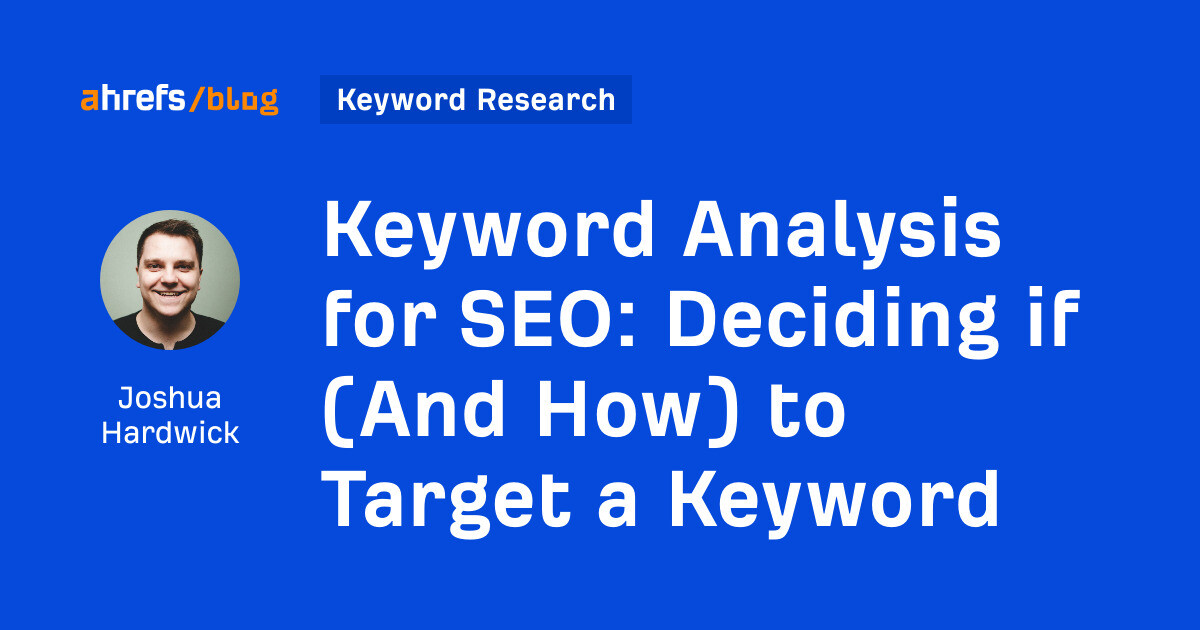
If you’re choosing keywords based on search volume alone, you’re making a mistake. You also need to consider whether the keyword makes sense for your business and whether you can realistically rank for it.
Here’s the process:
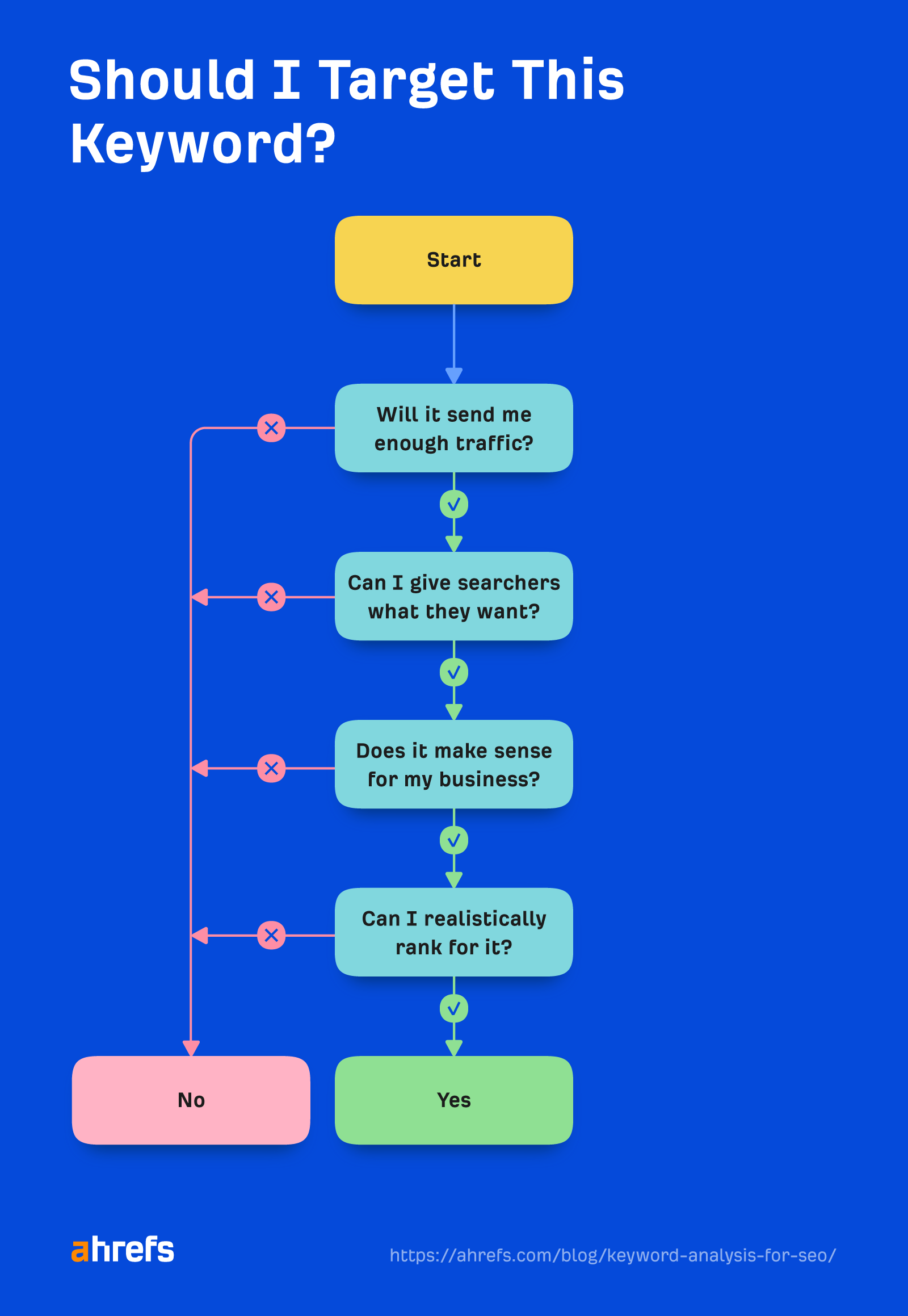
Let’s go through the steps in more detail.
People usually rely on search volumes for this, but they can be misleading.
For example, “pheasant breast recipes” gets an estimated 1.9K monthly searches in the U.S. But the top-ranking page gets far less traffic:
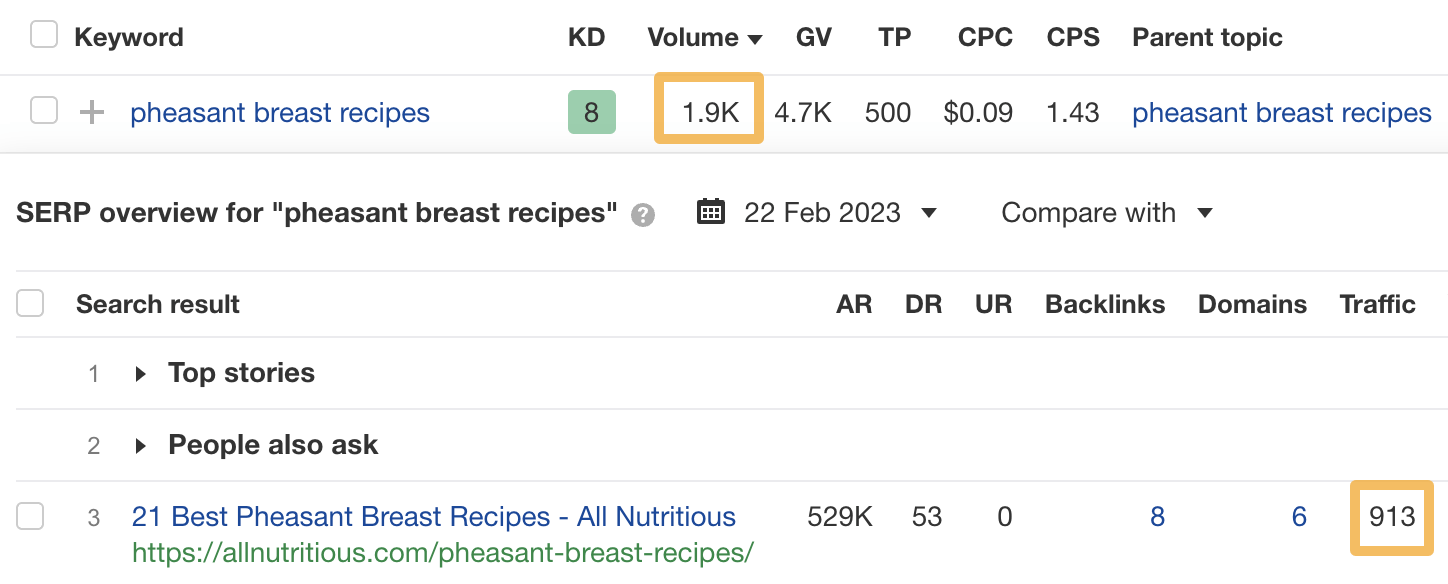
It’s the opposite for “backlink checker.” The top-ranking page gets an estimated 27K monthly visits despite the keyword having only 5.9K monthly searches.

Here are a few reasons why this can happen:
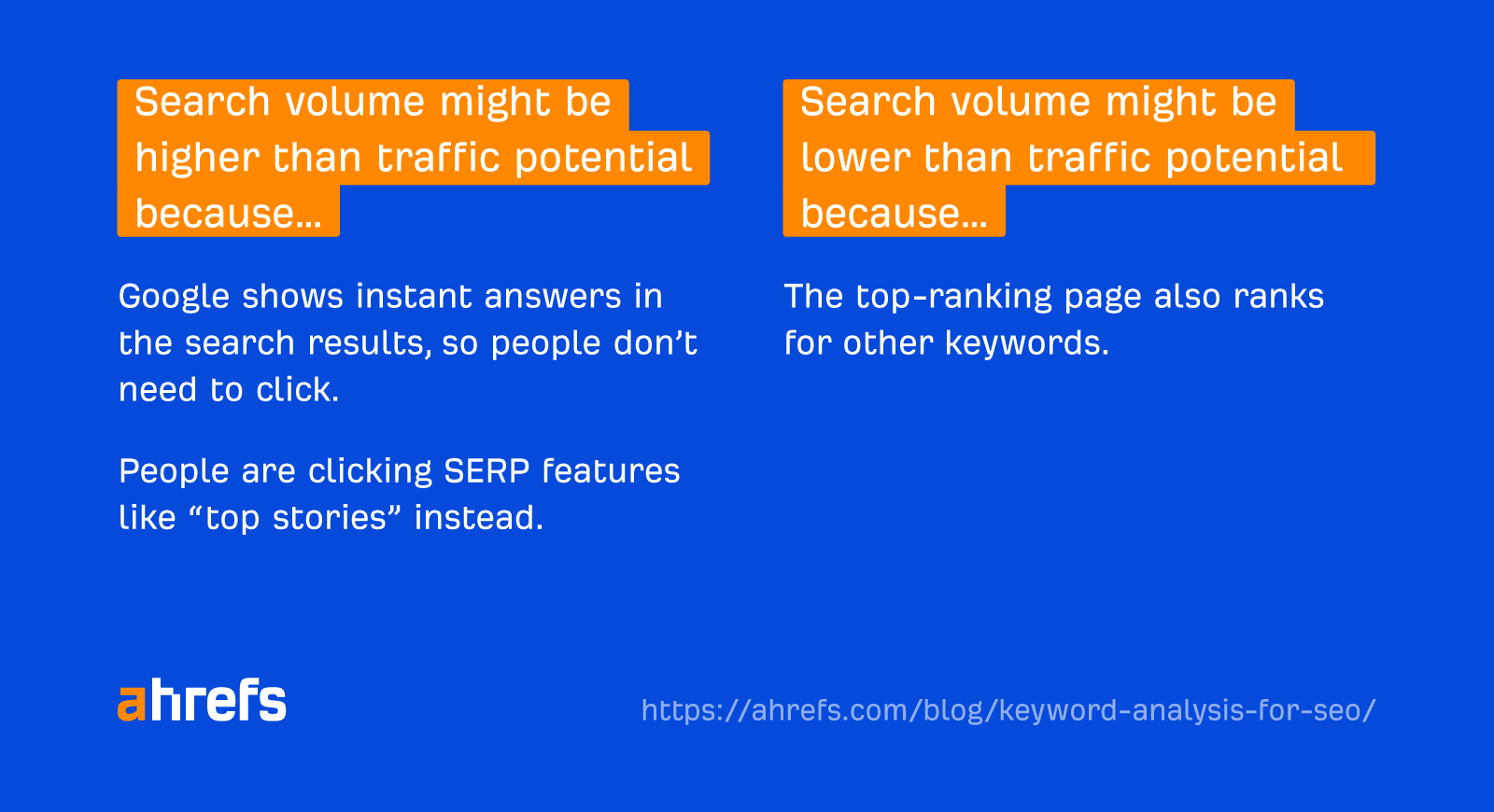
What’s the solution?
Use the top-ranking page’s as a proxy for traffic potential instead of search volumes.
If you’re an Ahrefs user, the Traffic Potential (TP) metric in Keywords Explorer tells you this. You can even sort and filter keyword ideas by TP to make sure you focus on keywords that are likely to send you decent traffic.
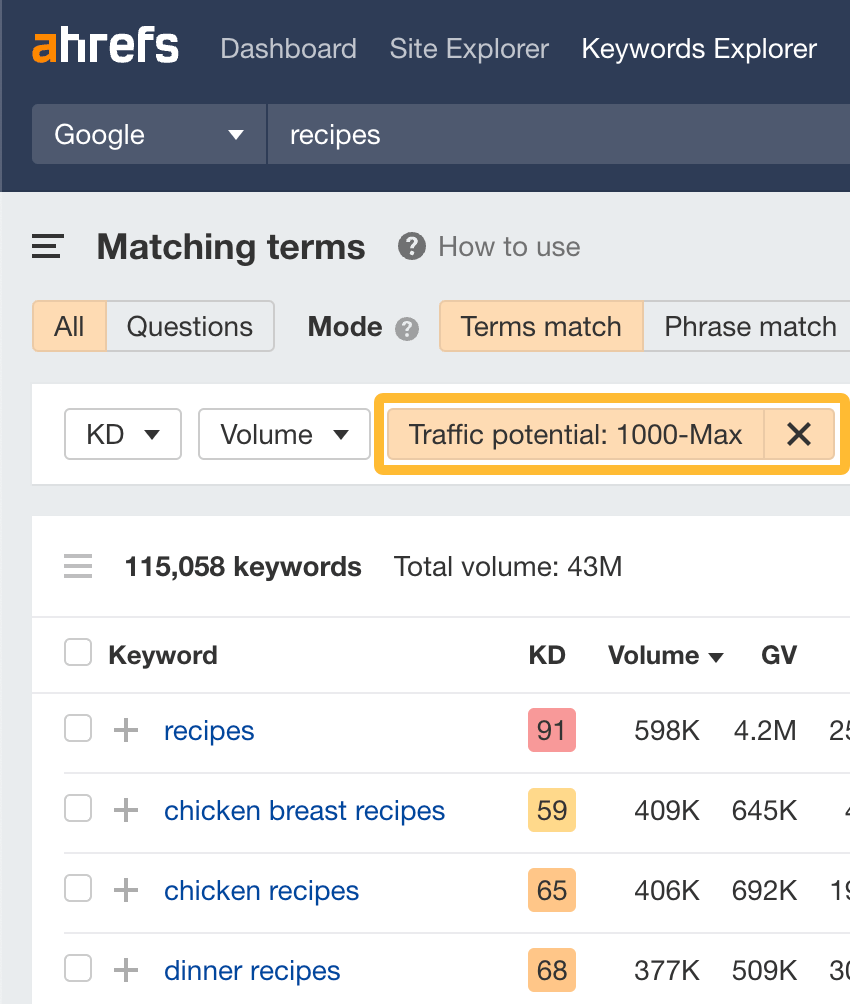
If you’re not an Ahrefs user, plug the top-ranking page’s URL into our free traffic checker.
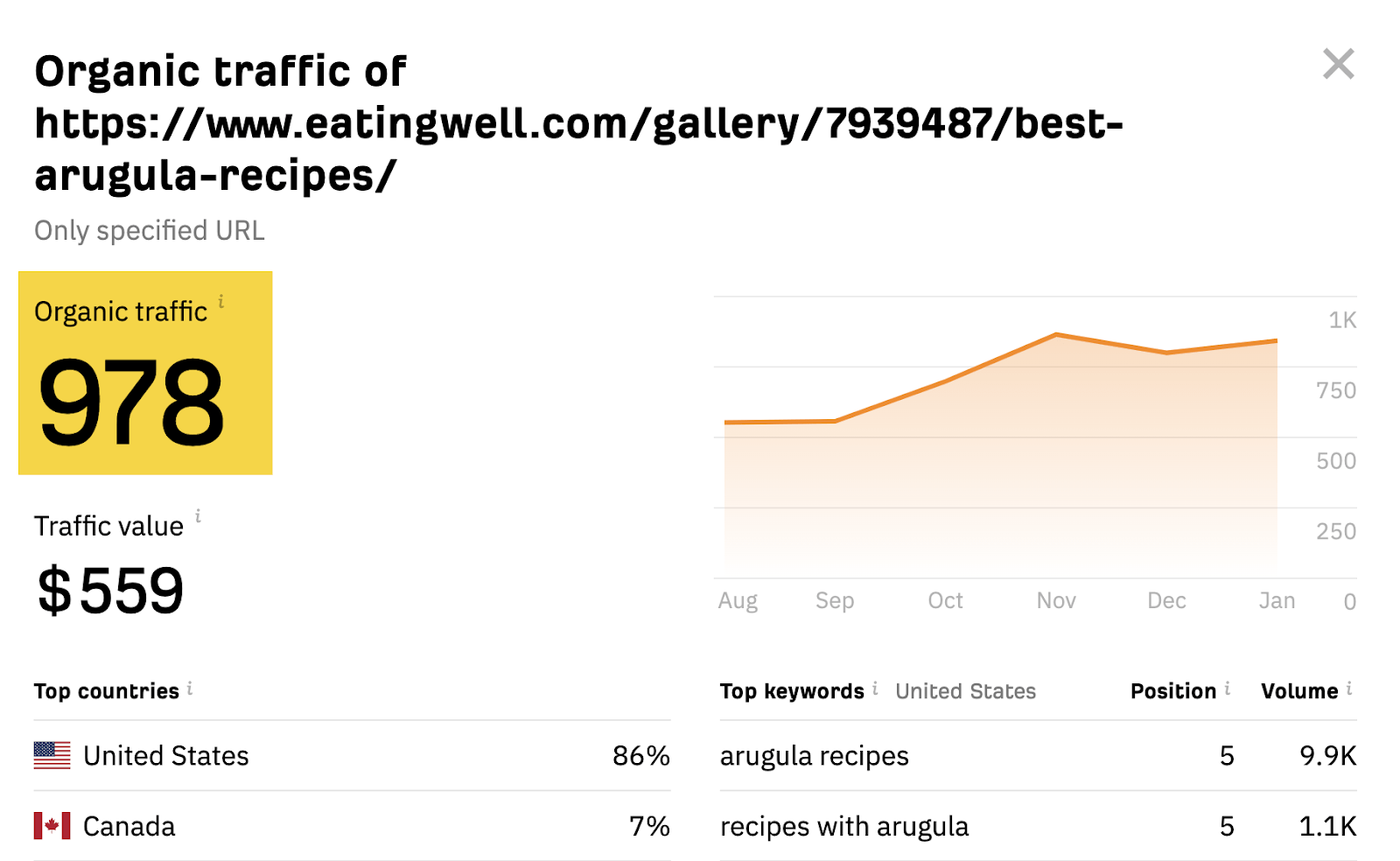
Tip: check the search volume trend
For example, Keywords Explorer shows that searches for “how does wordle work” are declining:
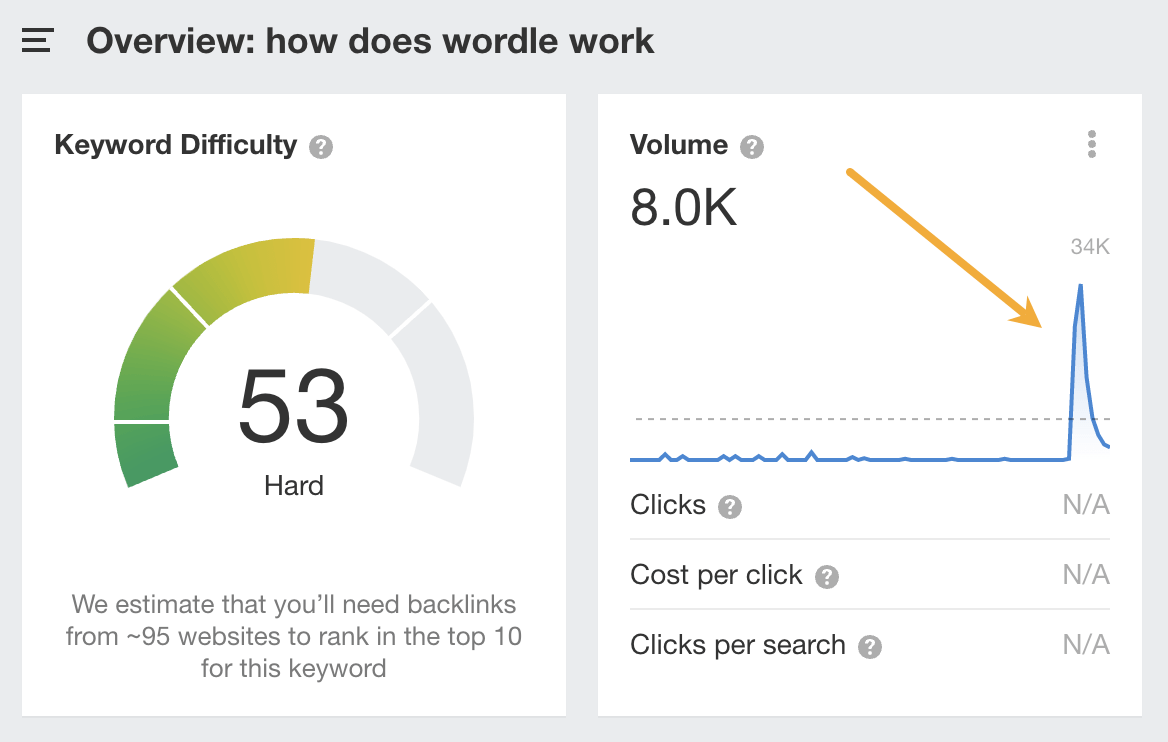
This is echoed in Google Trends:

Google wants to rank the type of content that searchers are looking for. Unless you can create that, your chances of ranking on the first page are slim to none.
Here are five common content types and the resources you’ll need to create them:
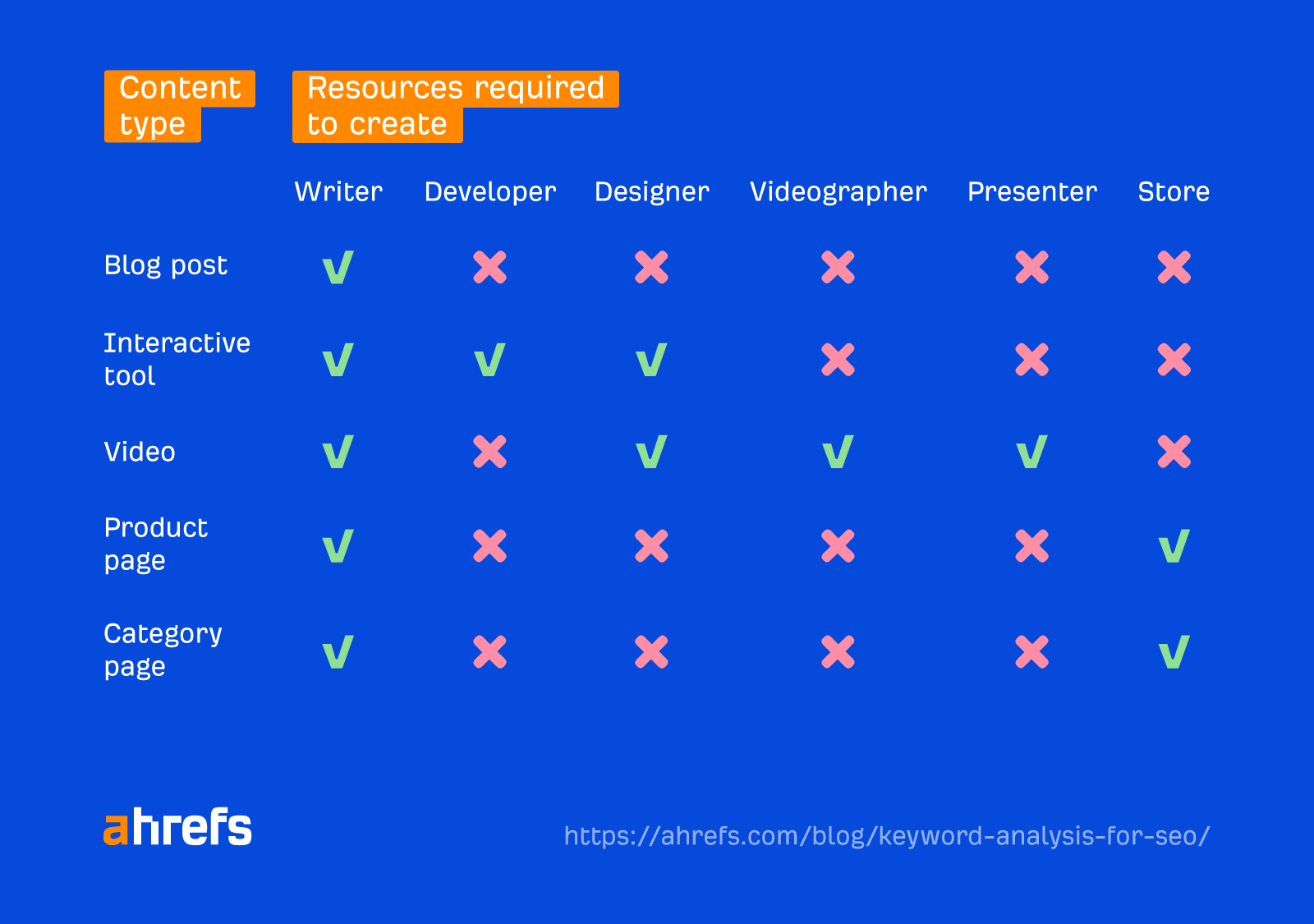
How do you know which one searchers are looking for?
The answer is pretty obvious for some keywords. For example, people searching for “loan calculator” clearly want an interactive tool, while those searching for “buy homepod mini” want a product page.
If it isn’t obvious for your keyword, the first page of results usually paints a pretty good picture.
For example, all first-page results for “days between dates” are interactive calculators:
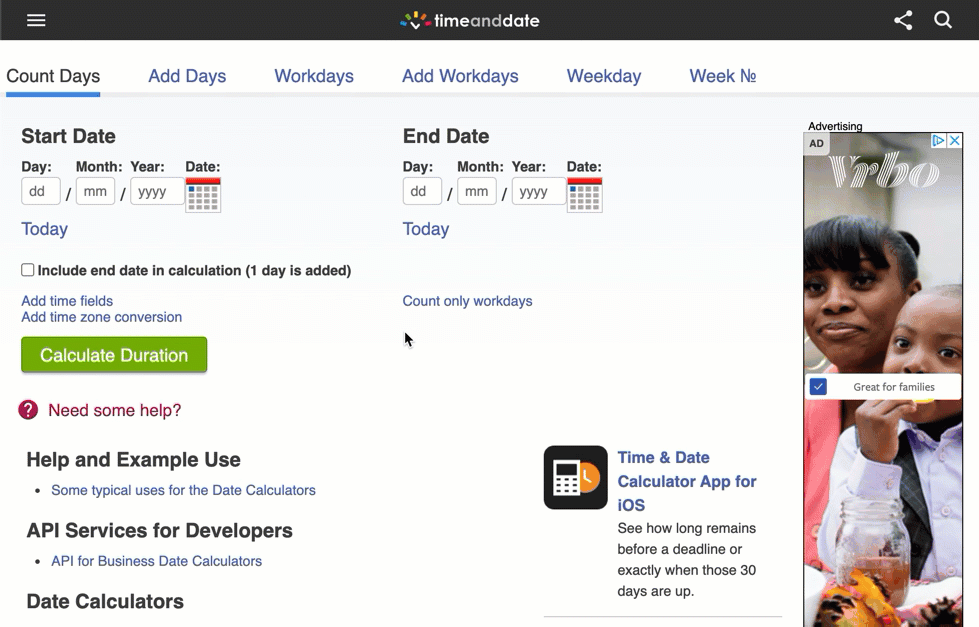
This means that unless you have access to a developer and designer, you can’t create what searchers want and will struggle to rank.
On the other hand, most first-page results for “excel difference between two dates” are essentially blog posts:

This means that all you need is a writer to create the kind of content searchers want.
Tip: always pull unpersonalized search results
If you’re using our SEO Toolbar, click the extension icon in your browser, toggle “SERP tools” on, then choose a location in the “Local search simulator” section.
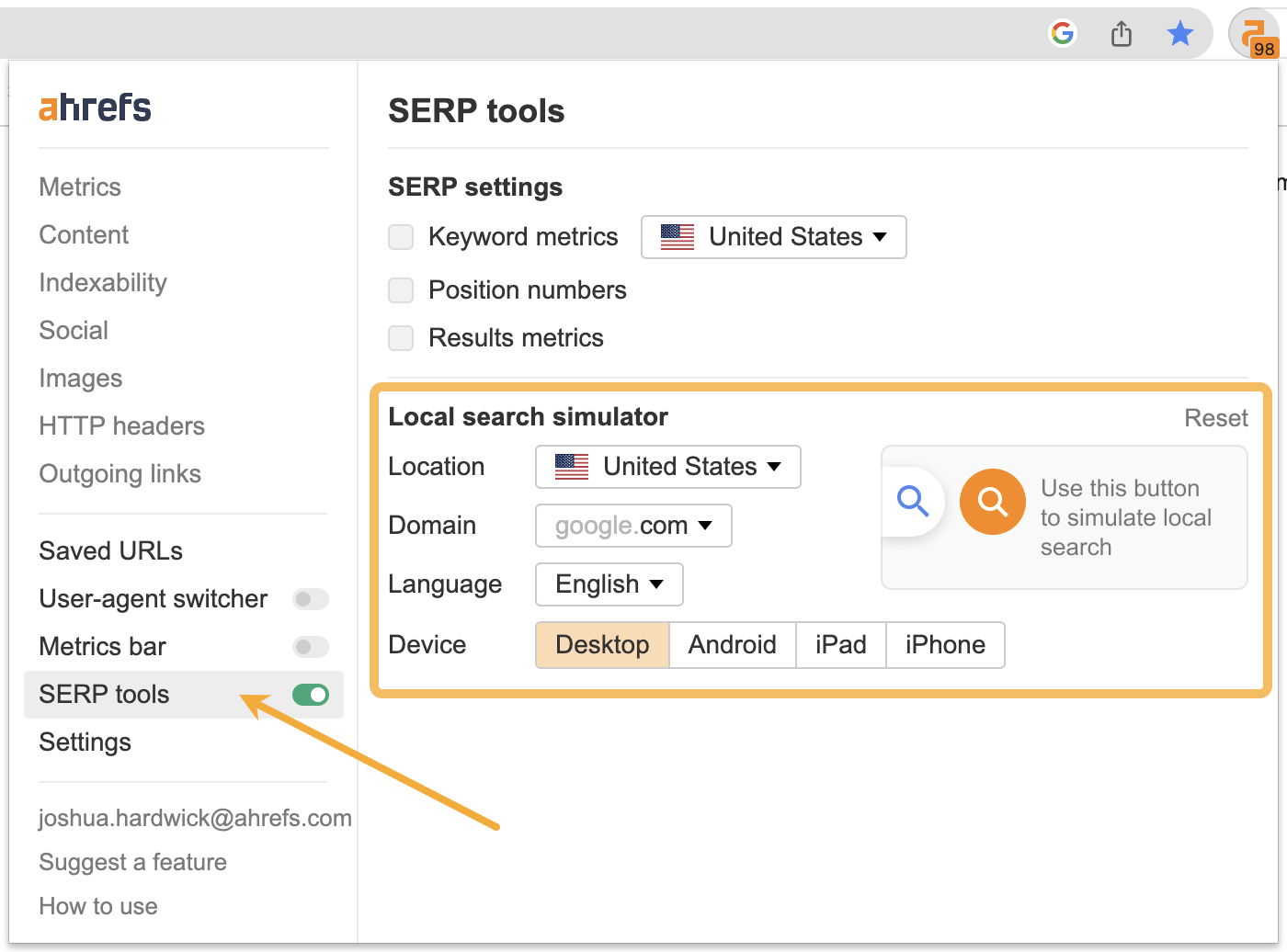
If you’re using Ahrefs’ Keywords Explorer, choose a country from the dropdown.
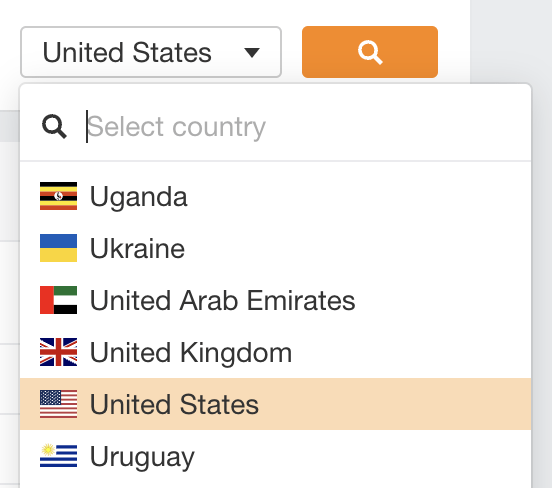
If you ranked the type of content searchers are looking for, would it be valuable for you?
The most common way of answering this is to map keywords to the buyer’s journey.
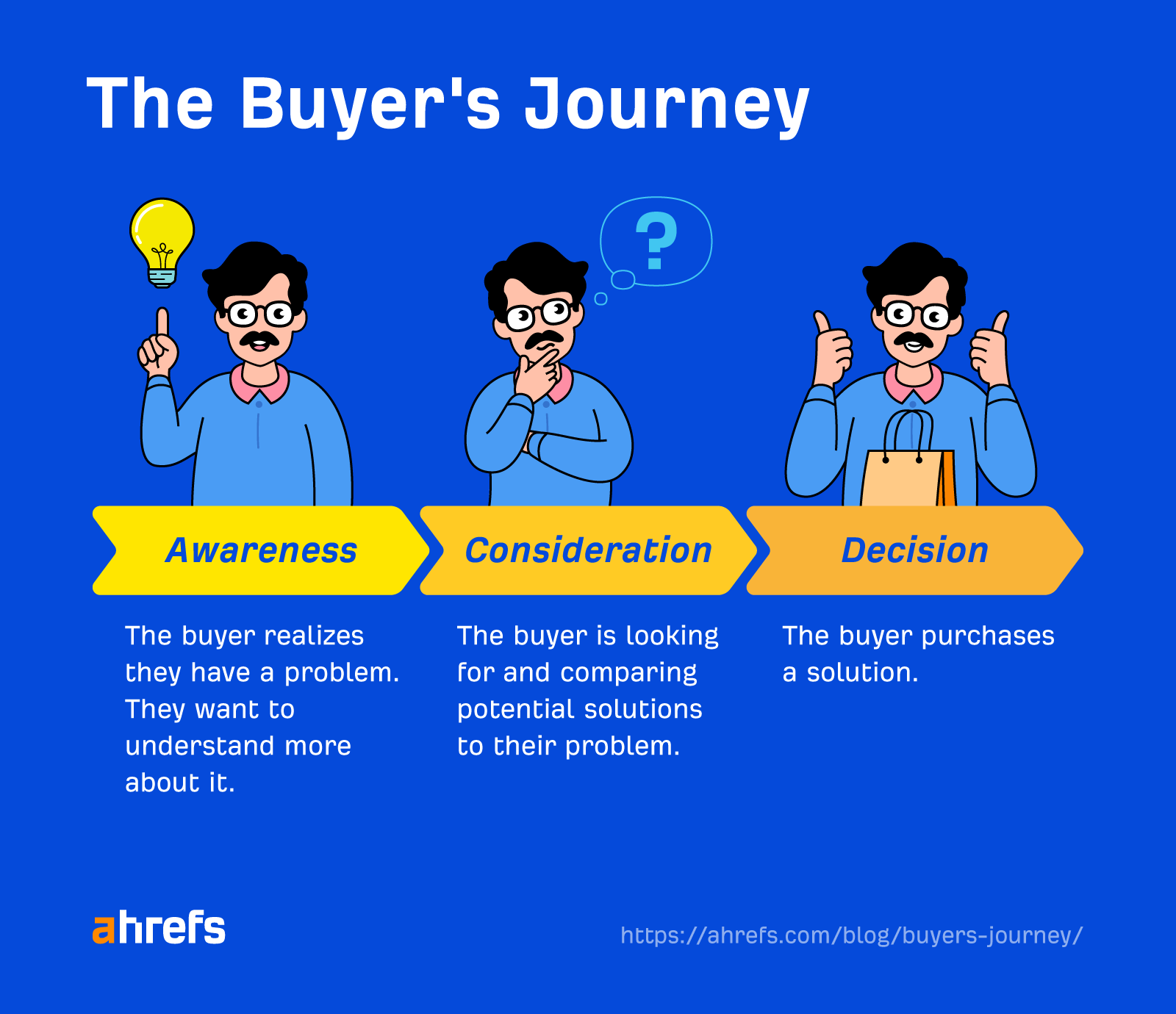
The idea is simple: The earlier people are in their journey, the less likely they are to buy your product or service (and the less value the keyword has for you).
Here’s an example for our business:
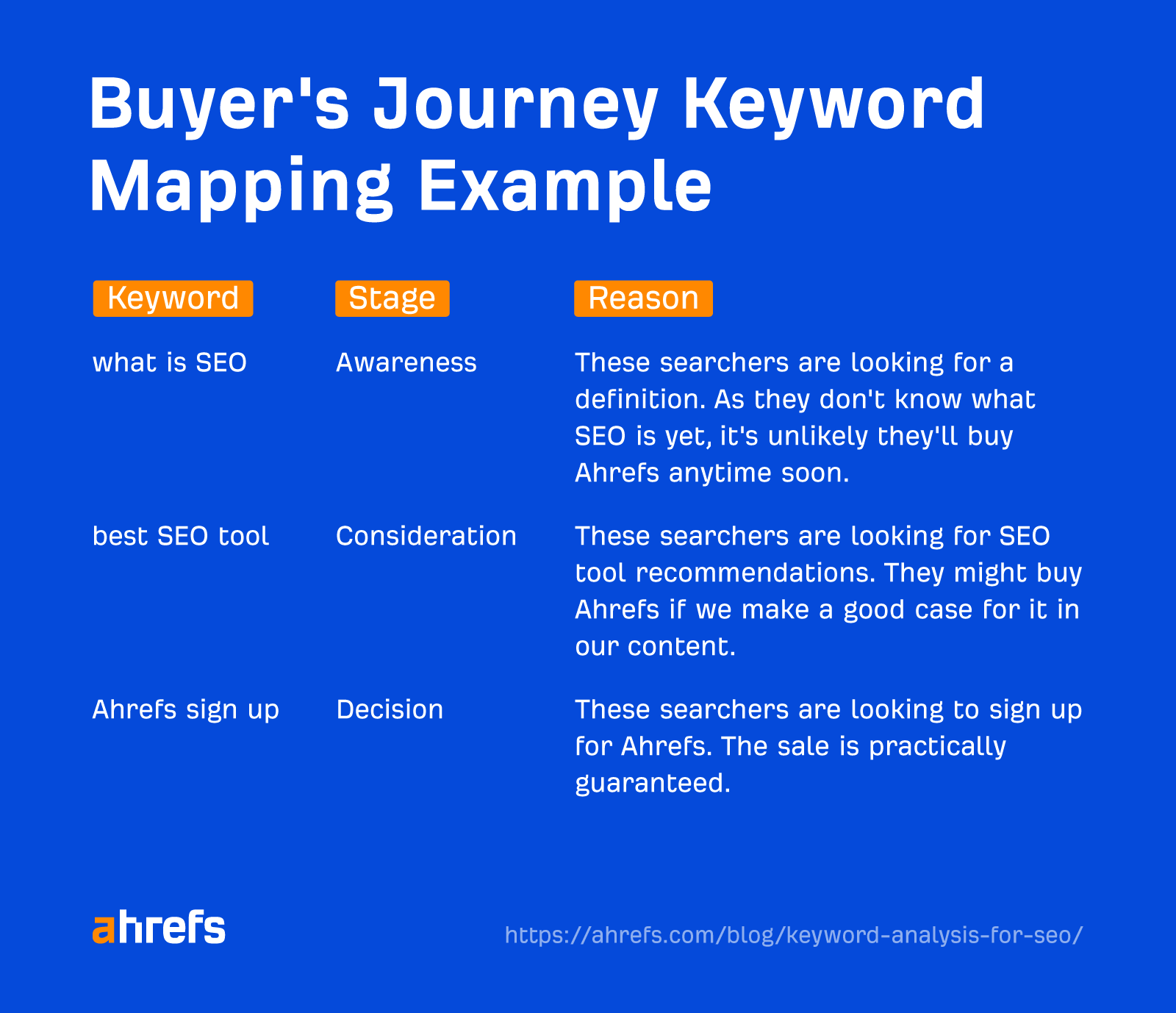
This model is OK, but it has some flaws, as Tim Soulo covers in his keyword research guide.
For that reason, we developed our own model for determining the so-called “value” of a keyword. It’s called “Business Potential,” and it scores keywords between 0 and 3—depending on how easy it will be to pitch your product or service in your content.
Here’s an example for Ahrefs:
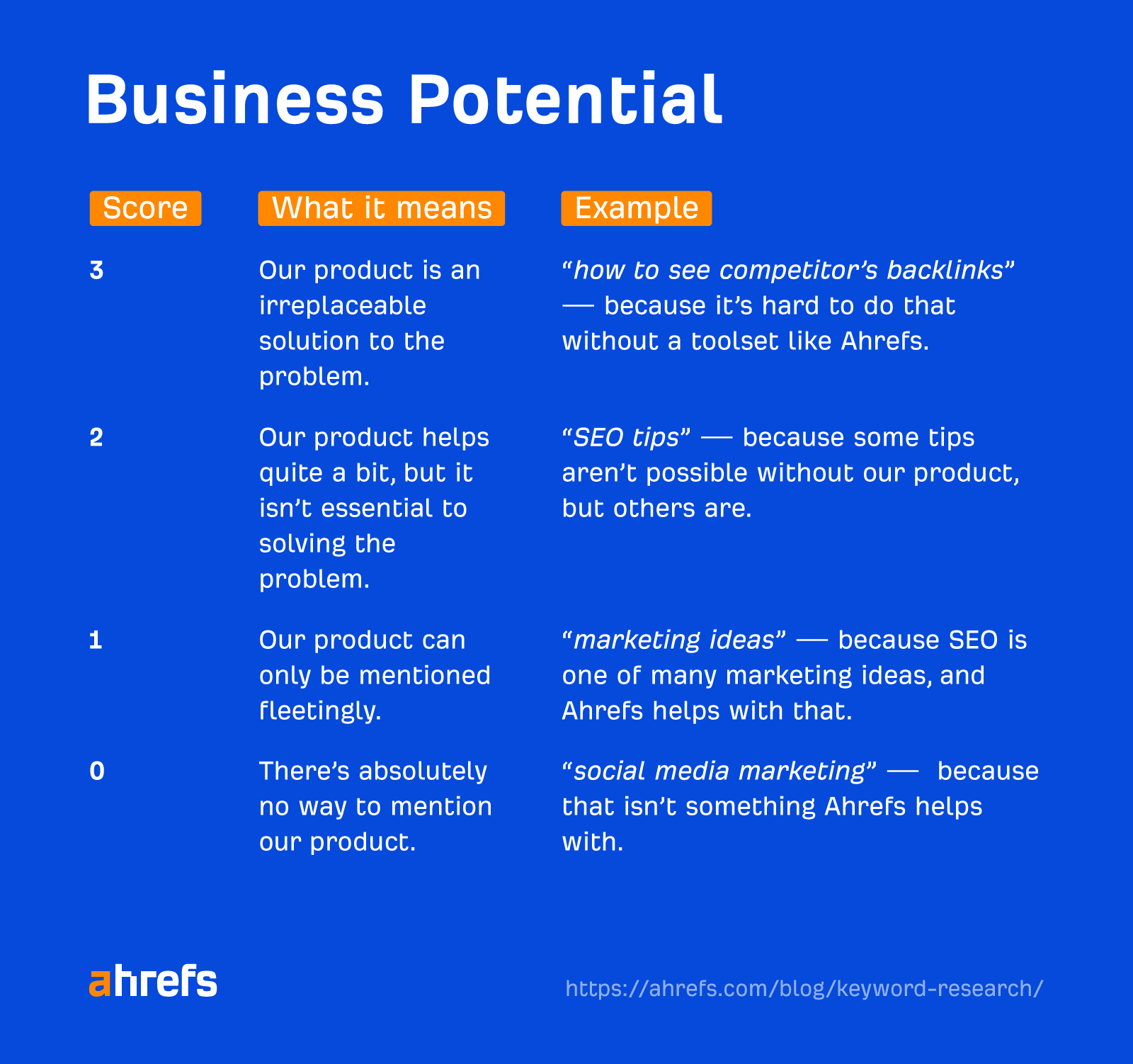
It’s up to you which model you prefer; just make sure to keep search intent in mind when judging a keyword’s value.
Some keywords are harder to rank for than others.
Here are three questions to ask to decide how likely you are to rank for a keyword.
A. How many backlinks do I need?
Backlinks are one of Google’s main ranking factors. This means that if you’re competing against pages with lots of backlinks already, you’ll need to build lots of backlinks to your page—and that’s hard.
For a super rough idea of how many backlinks you’ll need to rank, check the hint below the Keyword Difficulty (KD) score in Ahrefs’ Keywords Explorer (or use our free Keyword Difficulty checker).
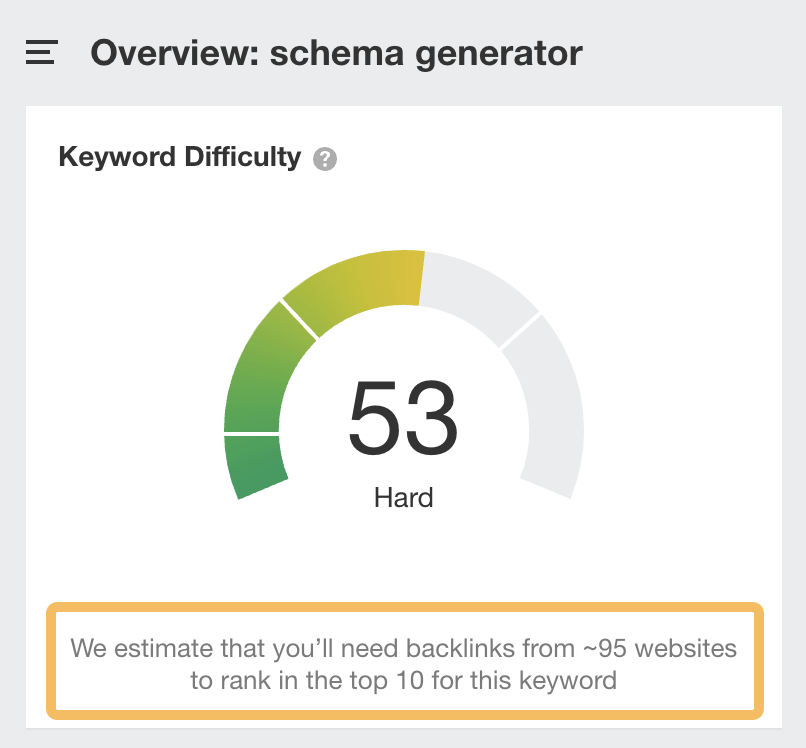
However, there are two important caveats to this number:
- It estimates how many backlinks you need to rank in the top 10, not #1 – You’ll probably need at least this many high-quality backlinks, if not more, to crack the first position.
- It doesn’t take link quality into account – Some backlinks cast stronger “votes” than others. If the top-ranking pages have lots of low-quality or mediocre links, you probably won’t need that many high-quality links to rank in the top 10.
For a much better sense of how many good backlinks you need, you’ll need to audit the backlink profiles of the top-ranking pages.
Here’s a good starting point courtesy of Glen Allsopp, founder of Detailed.com:
For example, Keywords Explorer tells us that the top-ranking page for “schema generator” has backlinks from almost 2.6K domains.

But if we plug that URL into Ahrefs’ Site Explorer, check the Backlinks report, and apply Glen’s filters (along with a couple of others to exclude links from low-authority domains without traffic), that number drops by ~66% to 879.

In this case, that’s still a lot of backlinks, but you can see how these filters could take some keywords from “I’ll never get that many backlinks” to “I think I can manage that.”
B. How “authoritative” are the websites in the search results?
Google has consistently denied using any kind of website authority metric in its ranking algorithms. Yet, when Tim surveyed his audience of SEOs on Twitter, almost two-thirds said they take it into account when analyzing their chances of ranking for a keyword.
If you want to do the same, eyeball the Domain Rating (DR) column in Keywords Explorer.
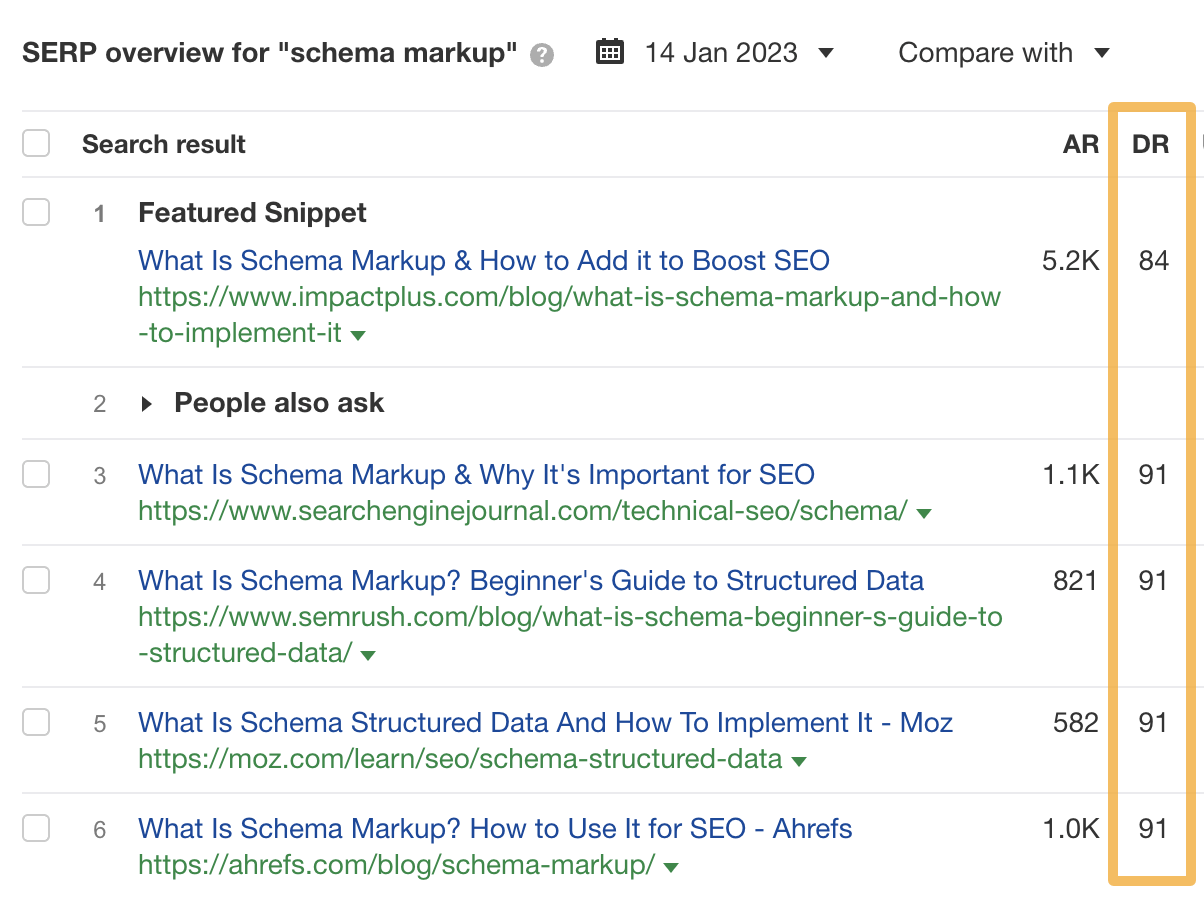
If the top-ranking websites have the same or lower DR than you (use Site Explorer or our free website authority checker to check), that’s a good sign. If their DR scores are way higher, their high authority may indirectly be helping them to rank for a couple of reasons:
They have more PR
High-authority websites have lots of high-authority pages. If they have lots of internal links pointing from those pages to the one you see ranking for your target keyword, that may be in part why it’s ranking so high.
They’re a familiar brand
People often want to see results from familiar brands, so it’s likely that Google’s algorithms take this into account either directly or indirectly. This is likely in part why you see big brands like Target and Macy’s ranking for some terms even with few backlinks.
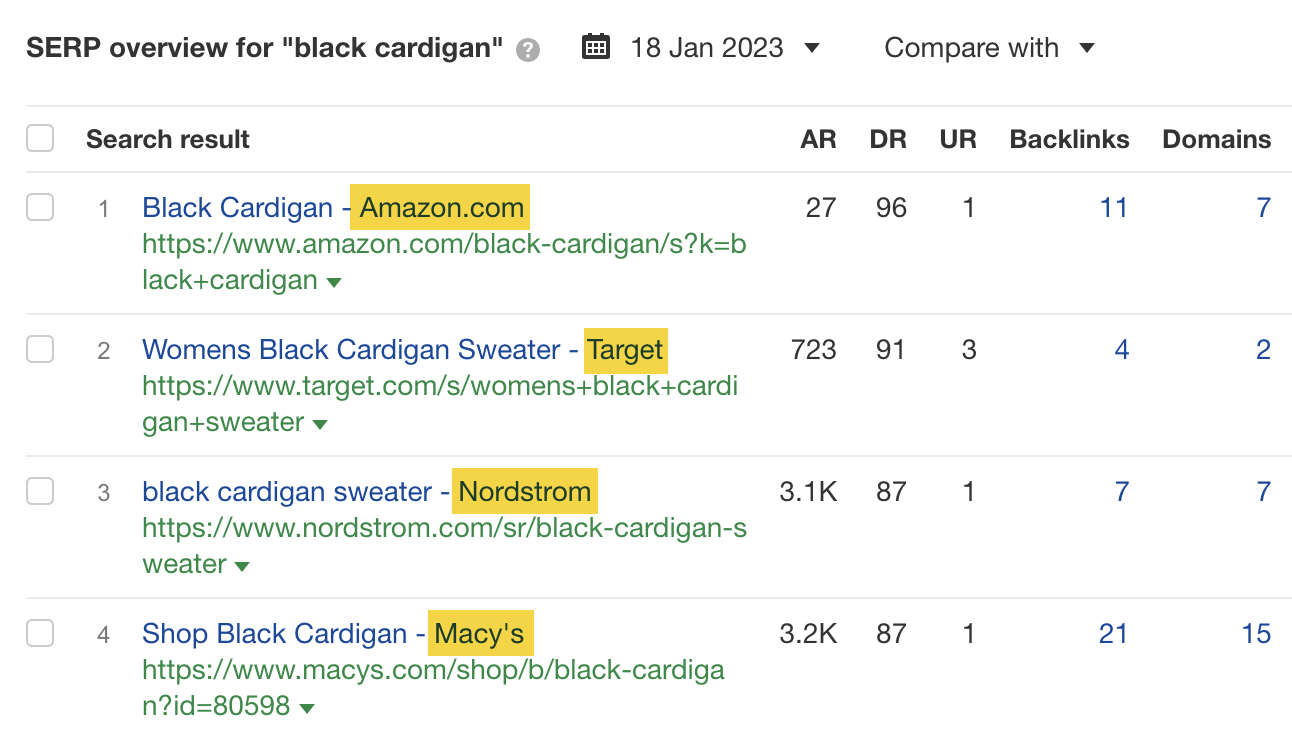
Tip: find keywords where similar caliber sites rank
- Enter a topic into Keywords Explorer
- Go to the Matching terms report
- Enter your site’s DR into the “Lowest DR” filter and choose “In top 5” from the dropdown
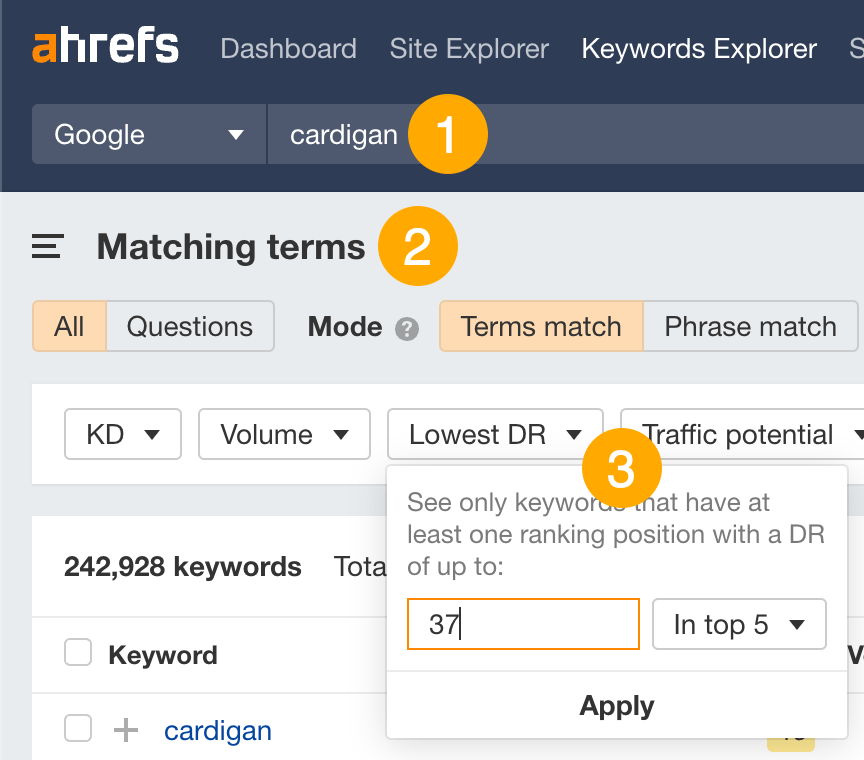
C. How good is the content?
Even if you can create the kind of content searchers are looking for with relative ease, beating the competition on quality may not be so easy.
This is important, as Google’s algorithms are designed to surface pages that demonstrate E-E-A-T, which stands for experience, expertise, authoritativeness, and trust.
Here’s a quick breakdown of these four things:
- Experience – Do you have firsthand or life experience on the topic?
- Expertise – Do you have the necessary knowledge or skill for this topic?
- Authoritativeness – Are you known as a go-to source for the topic?
- Trust – Is the page accurate, safe, honest, and reliable?
In short, the higher the top-ranking pages score when it comes to these things, the harder it’ll be to create content that stands a good chance of outranking them.
For example, the top three results for “lump on neck” are written or reviewed by doctors and registered nurses:
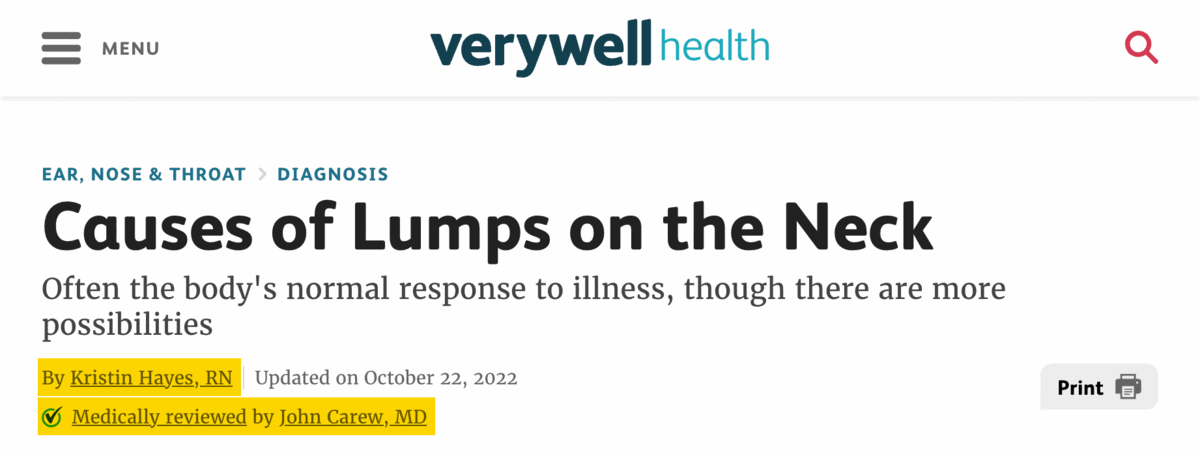
These websites are also arguably go-to sources for information about medical conditions.
As a result, unless you’re a doctor and your website has a similar reputation, you won’t be able to demonstrate anywhere near the same level of E-E-A-T in your content.
However, if you look at the top results for a keyword like “best projectors under 300,” it’s pretty obvious from the use of stock images that the authors have no firsthand experience with any of the recommended products:

This would be much easier to beat on quality. You just need to demonstrate firsthand experience.
Final thoughts
Keywords with the potential to send you lots of traffic aren’t always worth trying to rank for. They also need to make sense for your business, and you need to give searchers the best quality version of what they’re looking for to stand a chance at competing.
Got questions? Ping me on Twitter.
SEO
Google On Hyphens In Domain Names

Google’s John Mueller answered a question on Reddit about why people don’t use hyphens with domains and if there was something to be concerned about that they were missing.
Domain Names With Hyphens For SEO
I’ve been working online for 25 years and I remember when using hyphens in domains was something that affiliates did for SEO when Google was still influenced by keywords in the domain, URL, and basically keywords anywhere on the webpage. It wasn’t something that everyone did, it was mainly something that was popular with some affiliate marketers.
Another reason for choosing domain names with keywords in them was that site visitors tended to convert at a higher rate because the keywords essentially prequalified the site visitor. I know from experience how useful two-keyword domains (and one word domain names) are for conversions, as long as they didn’t have hyphens in them.
A consideration that caused hyphenated domain names to fall out of favor is that they have an untrustworthy appearance and that can work against conversion rates because trustworthiness is an important factor for conversions.
Lastly, hyphenated domain names look tacky. Why go with tacky when a brandable domain is easier for building trust and conversions?
Domain Name Question Asked On Reddit
This is the question asked on Reddit:
“Why don’t people use a lot of domains with hyphens? Is there something concerning about it? I understand when you tell it out loud people make miss hyphen in search.”
And this is Mueller’s response:
“It used to be that domain names with a lot of hyphens were considered (by users? or by SEOs assuming users would? it’s been a while) to be less serious – since they could imply that you weren’t able to get the domain name with fewer hyphens. Nowadays there are a lot of top-level-domains so it’s less of a thing.
My main recommendation is to pick something for the long run (assuming that’s what you’re aiming for), and not to be overly keyword focused (because life is too short to box yourself into a corner – make good things, course-correct over time, don’t let a domain-name limit what you do online). The web is full of awkward, keyword-focused short-lived low-effort takes made for SEO — make something truly awesome that people will ask for by name. If that takes a hyphen in the name – go for it.”
Pick A Domain Name That Can Grow
Mueller is right about picking a domain name that won’t lock your site into one topic. When a site grows in popularity the natural growth path is to expand the range of topics the site coves. But that’s hard to do when the domain is locked into one rigid keyword phrase. That’s one of the downsides of picking a “Best + keyword + reviews” domain, too. Those domains can’t grow bigger and look tacky, too.
That’s why I’ve always recommended brandable domains that are memorable and encourage trust in some way.
Read the post on Reddit:
Read Mueller’s response here.
Featured Image by Shutterstock/Benny Marty
SEO
Reddit Post Ranks On Google In 5 Minutes

Google’s Danny Sullivan disputed the assertions made in a Reddit discussion that Google is showing a preference for Reddit in the search results. But a Redditor’s example proves that it’s possible for a Reddit post to rank in the top ten of the search results within minutes and to actually improve rankings to position #2 a week later.
Discussion About Google Showing Preference To Reddit
A Redditor (gronetwork) complained that Google is sending so many visitors to Reddit that the server is struggling with the load and shared an example that proved that it can only take minutes for a Reddit post to rank in the top ten.
That post was part of a 79 post Reddit thread where many in the r/SEO subreddit were complaining about Google allegedly giving too much preference to Reddit over legit sites.
The person who did the test (gronetwork) wrote:
“…The website is already cracking (server down, double posts, comments not showing) because there are too many visitors.
…It only takes few minutes (you can test it) for a post on Reddit to appear in the top ten results of Google with keywords related to the post’s title… (while I have to wait months for an article on my site to be referenced). Do the math, the whole world is going to spam here. The loop is completed.”
Reddit Post Ranked Within Minutes
Another Redditor asked if they had tested if it takes “a few minutes” to rank in the top ten and gronetwork answered that they had tested it with a post titled, Google SGE Review.
gronetwork posted:
“Yes, I have created for example a post named “Google SGE Review” previously. After less than 5 minutes it was ranked 8th for Google SGE Review (no quotes). Just after Washingtonpost.com, 6 authoritative SEO websites and Google.com’s overview page for SGE (Search Generative Experience). It is ranked third for SGE Review.”
It’s true, not only does that specific post (Google SGE Review) rank in the top 10, the post started out in position 8 and it actually improved ranking, currently listed beneath the number one result for the search query “SGE Review”.
Screenshot Of Reddit Post That Ranked Within Minutes
Anecdotes Versus Anecdotes
Okay, the above is just one anecdote. But it’s a heck of an anecdote because it proves that it’s possible for a Reddit post to rank within minutes and get stuck in the top of the search results over other possibly more authoritative websites.
hankschrader79 shared that Reddit posts outrank Toyota Tacoma forums for a phrase related to mods for that truck.
Google’s Danny Sullivan responded to that post and the entire discussion to dispute that Reddit is not always prioritized over other forums.
Danny wrote:
“Reddit is not always prioritized over other forums. [super vhs to mac adapter] I did this week, it goes Apple Support Community, MacRumors Forum and further down, there’s Reddit. I also did [kumo cloud not working setup 5ghz] recently (it’s a nightmare) and it was the Netgear community, the SmartThings Community, GreenBuildingAdvisor before Reddit. Related to that was [disable 5g airport] which has Apple Support Community above Reddit. [how to open an 8 track tape] — really, it was the YouTube videos that helped me most, but it’s the Tapeheads community that comes before Reddit.
In your example for [toyota tacoma], I don’t even get Reddit in the top results. I get Toyota, Car & Driver, Wikipedia, Toyota again, three YouTube videos from different creators (not Toyota), Edmunds, a Top Stories unit. No Reddit, which doesn’t really support the notion of always wanting to drive traffic just to Reddit.
If I guess at the more specific query you might have done, maybe [overland mods for toyota tacoma], I get a YouTube video first, then Reddit, then Tacoma World at third — not near the bottom. So yes, Reddit is higher for that query — but it’s not first. It’s also not always first. And sometimes, it’s not even showing at all.”
hankschrader79 conceded that they were generalizing when they wrote that Google always prioritized Reddit. But they also insisted that that didn’t diminish what they said is a fact that Google’s “prioritization” forum content has benefitted Reddit more than actual forums.
Why Is The Reddit Post Ranked So High?
It’s possible that Google “tested” that Reddit post in position 8 within minutes and that user interaction signals indicated to Google’s algorithms that users prefer to see that Reddit post. If that’s the case then it’s not a matter of Google showing preference to Reddit post but rather it’s users that are showing the preference and the algorithm is responding to those preferences.
Nevertheless, an argument can be made that user preferences for Reddit can be a manifestation of Familiarity Bias. Familiarity Bias is when people show a preference for things that are familiar to them. If a person is familiar with a brand because of all the advertising they were exposed to then they may show a bias for the brand products over unfamiliar brands.
Users who are familiar with Reddit may choose Reddit because they don’t know the other sites in the search results or because they have a bias that Google ranks spammy and optimized websites and feel safer reading Reddit.
Google may be picking up on those user interaction signals that indicate a preference and satisfaction with the Reddit results but those results may simply be biases and not an indication that Reddit is trustworthy and authoritative.
Is Reddit Benefiting From A Self-Reinforcing Feedback Loop?
It may very well be that Google’s decision to prioritize user generated content may have started a self-reinforcing pattern that draws users in to Reddit through the search results and because the answers seem plausible those users start to prefer Reddit results. When they’re exposed to more Reddit posts their familiarity bias kicks in and they start to show a preference for Reddit. So what could be happening is that the users and Google’s algorithm are creating a self-reinforcing feedback loop.
Is it possible that Google’s decision to show more user generated content has kicked off a cycle where more users are exposed to Reddit which then feeds back into Google’s algorithm which in turn increases Reddit visibility, regardless of lack of expertise and authoritativeness?
Featured Image by Shutterstock/Kues
SEO
WordPress Releases A Performance Plugin For “Near-Instant Load Times”

WordPress released an official plugin that adds support for a cutting edge technology called speculative loading that can help boost site performance and improve the user experience for site visitors.
Speculative Loading
Rendering means constructing the entire webpage so that it instantly displays (rendering). When your browser downloads the HTML, images, and other resources and puts it together into a webpage, that’s rendering. Prerendering is putting that webpage together (rendering it) in the background.
What this plugin does is to enable the browser to prerender the entire webpage that a user might navigate to next. The plugin does that by anticipating which webpage the user might navigate to based on where they are hovering.
Chrome lists a preference for only prerendering when there is an at least 80% probability of a user navigating to another webpage. The official Chrome support page for prerendering explains:
“Pages should only be prerendered when there is a high probability the page will be loaded by the user. This is why the Chrome address bar prerendering options only happen when there is such a high probability (greater than 80% of the time).
There is also a caveat in that same developer page that prerendering may not happen based on user settings, memory usage and other scenarios (more details below about how analytics handles prerendering).
The Speculative Loading API solves a problem that previous solutions could not because in the past they were simply prefetching resources like JavaScript and CSS but not actually prerendering the entire webpage.
The official WordPress announcement explains it like this:
Introducing the Speculation Rules API
The Speculation Rules API is a new web API that solves the above problems. It allows defining rules to dynamically prefetch and/or prerender URLs of certain structure based on user interaction, in JSON syntax—or in other words, speculatively preload those URLs before the navigation. This API can be used, for example, to prerender any links on a page whenever the user hovers over them.”
The official WordPress page about this new functionality describes it:
“The Speculation Rules API is a new web API… It allows defining rules to dynamically prefetch and/or prerender URLs of certain structure based on user interaction, in JSON syntax—or in other words, speculatively preload those URLs before the navigation.
This API can be used, for example, to prerender any links on a page whenever the user hovers over them. Also, with the Speculation Rules API, “prerender” actually means to prerender the entire page, including running JavaScript. This can lead to near-instant load times once the user clicks on the link as the page would have most likely already been loaded in its entirety. However that is only one of the possible configurations.”
The new WordPress plugin adds support for the Speculation Rules API. The Mozilla developer pages, a great resource for HTML technical understanding describes it like this:
“The Speculation Rules API is designed to improve performance for future navigations. It targets document URLs rather than specific resource files, and so makes sense for multi-page applications (MPAs) rather than single-page applications (SPAs).
The Speculation Rules API provides an alternative to the widely-available <link rel=”prefetch”> feature and is designed to supersede the Chrome-only deprecated <link rel=”prerender”> feature. It provides many improvements over these technologies, along with a more expressive, configurable syntax for specifying which documents should be prefetched or prerendered.”
See also: Are Websites Getting Faster? New Data Reveals Mixed Results
Performance Lab Plugin
The new plugin was developed by the official WordPress performance team which occasionally rolls out new plugins for users to test ahead of possible inclusion into the actual WordPress core. So it’s a good opportunity to be first to try out new performance technologies.
The new WordPress plugin is by default set to prerender “WordPress frontend URLs” which are pages, posts, and archive pages. How it works can be fine-tuned under the settings:
Settings > Reading > Speculative Loading
Browser Compatibility
The Speculative API is supported by Chrome 108 however the specific rules used by the new plugin require Chrome 121 or higher. Chrome 121 was released in early 2024.
Browsers that do not support will simply ignore the plugin and will have no effect on the user experience.
Check out the new Speculative Loading WordPress plugin developed by the official core WordPress performance team.
How Analytics Handles Prerendering
A WordPress developer commented with a question asking how Analytics would handle prerendering and someone else answered that it’s up to the Analytics provider to detect a prerender and not count it as a page load or site visit.
Fortunately both Google Analytics and Google Publisher Tags (GPT) both are able to handle prerenders. The Chrome developers support page has a note about how analytics handles prerendering:
“Google Analytics handles prerender by delaying until activation by default as of September 2023, and Google Publisher Tag (GPT) made a similar change to delay triggering advertisements until activation as of November 2023.”
Possible Conflict With Ad Blocker Extensions
There are a couple things to be aware of about this plugin, aside from the fact that it’s an experimental feature that requires Chrome 121 or higher.
A comment by a WordPress plugin developer that this feature may not work with browsers that are using the uBlock Origin ad blocking browser extension.
Download the plugin:
Speculative Loading Plugin by the WordPress Performance Team
Read the announcement at WordPress
Speculative Loading in WordPress
See also: WordPress, Wix & Squarespace Show Best CWV Rate Of Improvement
-

 WORDPRESS7 days ago
WORDPRESS7 days ago10 WordPress Influencers to Follow in 2024 – WordPress.com News
-

 SEARCHENGINES7 days ago
SEARCHENGINES7 days agoGoogle Image Search Adds Pixel Level Object Segmentation Animation
-

 MARKETING7 days ago
MARKETING7 days agoFeeling Stuck: What to Do When You Don’t Know What to Do
-

 PPC5 days ago
PPC5 days agoA History of Google AdWords and Google Ads: Revolutionizing Digital Advertising & Marketing Since 2000
-

 SEARCHENGINES6 days ago
SEARCHENGINES6 days agoMore Google March 2024 Core Update Ranking Volatility
-

 PPC6 days ago
PPC6 days agoCompetitor Monitoring: 7 ways to keep watch on the competition
-

 PPC5 days ago
PPC5 days ago31 Ready-to-Go Mother’s Day Messages for Social Media, Email, & More
-

 WORDPRESS6 days ago
WORDPRESS6 days agoThrive Architect vs Divi vs Elementor














